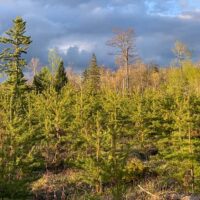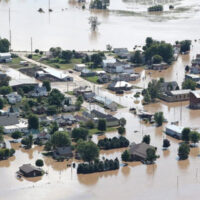
Warmer winters and extreme rain are stressing Wisconsin’s forest resources
Wisconsin forests cover nearly half of Wisconsin and provide a unique opportunity to address climate change by reducing concentrations of greenhouse gases while simultaneously providing essential social, environmental, and economic benefits.

Andrea Hicks named 2022-23 Fulbright Scholar
Andrea Hicks, who serves as a Nelson Institute affiliate, director of Sustainability Education and Research, Hanson Family Fellow in Sustainability, and associate professor of Civil and Environmental Engineering, has been named a 2022-23 Fulbright Scholar.

Nelson Graduate cohort report addresses flood resiliency in Wisconsin’s Driftless Region
A cohort of graduate students within the Nelson Institute’s Water Resources Management (WRM) program recently published a report that took an interdisciplinary approach to researching flood resilience in the Coon Creek watershed, an over 90,000-acre area in the unglaciated Driftless Area that crosses three Wisconsin counties and is considered the birthplace of modern soil conversation.

Sustainability projects showcase students’ creativity in Geography 309: People, Land and Food
A documentary of the F. H. King Students for Sustainable Agriculture. Paintings that address food waste and incorporate paint made from food scraps.

CCR graduate student awarded NCAR Fellowship
Rudradutt Thaker, research assistant with Nelson Institute’s Center for Climatic Research (CCR) and the Department of Atmospheric and Oceanic Sciences, has been awarded a fellowship through the National Center for Atmospheric Research's (NCAR) Graduate Visitor Program.

From the peach state to the badger state, EOI student works to monitor and preserve wetlands
Environmental Observation and Informatics (EOI) graduate student Kevin Ronczkowski has always been a badger fan.

WRM alumnus Jackson Parr is working to improve flood resilience planning in Wisconsin
As a journalist in Northeastern Wisconsin, Nelson Institute alumnus Jackson Parr often found himself writing about flooding and water quality issues.

Cutting air pollution emissions would save 50,000 U.S. lives, $600 billion each year
The study reports the health benefits of removing dangerous fine particulates released into the air by electricity generation, transportation, industrial activities and building functions like heating and cooking.







